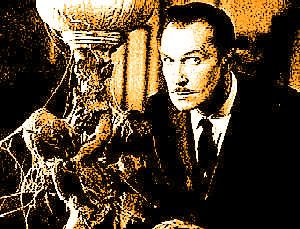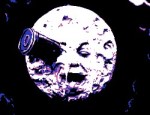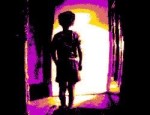Film Review
House on Haunted Hill is the
best in a series of low budget horror movies that were produced and
directed by William Castle in the late 1950s, early 1960s. Other
films in the series included:
Macabre
(1958),
13 Ghosts (1960) and
The Old Dark House (1963).
For several of these films, Castle made use of his patented Emergo
system, which involved flying a mock skeleton over the heads of his
audience on a pulley system at crucial moments in the film.
Needless to say the system did not endure, as it ended up being
used for target practice, by spectators who found a new and exciting
use for their popcorn and empty drinks cans.
House on Haunted Hill offers
enough good old-fashioned chills and thrills to make gimmicks such as Emergo an
unnecessary distraction. Its success inspired Alfred Hitchcock to
make his own low budget horror flick,
Psycho
(1960). Although the multi-twisted plot is too clever for
its own good, and is basically a complacent rip off of H.G. Clouzot's
Les
Diaboliques (1955), Castle draws the maximum possible menace
from it and crafts an intricate and compelling murder mystery (the
twist being that the murder hasn't yet taken place).
Some highly effective camerawork and lighting lend the film an
appropriately creepy atmosphere which is almost
guaranteed to bring on a chronic attack of goose bumps. The
macabre delights on offer include severed heads, floating zombies,
a rope with a life of its own, a walking skeleton with
overt homicidal tendencies and, scariest of all, a seductively
sinister Vincent Price. The underbelly
of dry dark humour adds to the film's entertainment value, helping to
make this a classic of its kind. Don't waste your time or
your money on the trashy 1999 remake; the original is far more satisfying.
© James Travers 2010
The above content is owned by frenchfilms.org and must not be copied.
Film Synopsis
At the suggestion of his wife, Annabelle, eccentric millionaire
Fredrick Loren invites five strangers to his house, offering each of
them ten thousand dollars if they manage to spend one full night in the
house. One of the guests, Watson Pritchard, is convinced that the
house is haunted, since his brother was murdered there by his wife, and
this was preceded by several other killings. One previous tenant
of the house died horrifically when he fell into a vat of acid in the
cellar, a vat which is still there. Dr David Trent
dismisses all this talk of ghosts and is confident he will collect his
cheque from Loren in the morning. Nora Manning is less
certain and becomes increasingly neurotic as she is assailed by a
series of frightening apparitions. Loren issues each of his guests
with a loaded gun, but, as one of the guests points out, these will
be useless against the spirits of the dead...
© James Travers
The above content is owned by frenchfilms.org and must not be copied.



